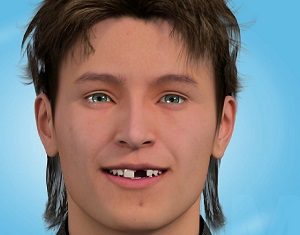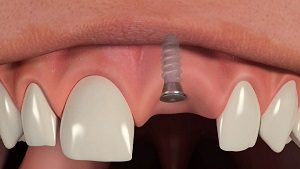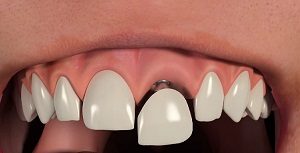Dental implants offer one of the most effective and long lasting ways to replace one or more missing teeth, providing a fixed alternative to removable dentures. Teeth can be lost for a number of reasons including decay, trauma, infection or gum disease, and this loss can result in a whole host of problems. Implants can improve how you eat and speak, prevent shrinkage of the jawbone, and keep existing teeth firmly in place.
Implants are titanium posts that are surgically placed in the jawbone to act just like tooth roots. As titanium is a durable metal that is very well tolerated by the body, these cylindrical posts eventually fuse with the bone, providing a firm foundation for a crown or bridge.
Benefits
- Unlike ill-fitting dentures, which can have a tendency to move around uncomfortably in your mouth, implants stay firmly in place.
- Implants help protect the jawbone by keeping it stimulated and they prevent existing teeth from moving around.
- They eliminate the speaking and chewing problems that may be caused by missing teeth or ill-fitting dentures.
- They can provide a significant boost to your confidence by restoring your smile.
Treatment steps
- We carry out a full assessment of your general health, how your teeth fit together, your oral health and the density of your jaw bone. If we discover you have insufficient bone volume, you may need a grafting procedure to allow for the successful placement of implants.
- The titanium posts are placed in the bone under a local anaesthetic using a relatively simple surgical procedure.
- Titanium is very well tolerated by the body, so over a few months the implants will bond with the bone – a process known as osseo-integration.
- Once settled in and fully healed, we can fit replacement teeth to the now firmly positioned implants.
Aftercare
You need to maintain good oral hygiene following treatment to ensure your implants remain trouble-free. If well looked after, with a regular brushing and flossing routine, they can last for over 15 years. You should also attend regular check-ups so your dentist can make sure your implants stay in great condition.
What are dental implants?
A dental implant is a titanium metal rod which is placed into the jawbone. It is used to sup port one or more false teeth. In practice, both the false teeth and their supporting rod are known as ‘implants’.
port one or more false teeth. In practice, both the false teeth and their supporting rod are known as ‘implants’.
Are implants safe? How long will they last?
Implants are a well-established, tried-and-tested treatment. 90 per cent of modern implants last for at least 15 years.
I have some of my own teeth. Can I still have implants?
Yes. You can have any number of teeth replaced with implants – from one single tooth to a complete set.
Can implants always be used to replace missing teeth?
It depends on the state of the bone in your jaw. Your dentist will arrange for a number of special tests to assess the amount of bone still there. If there is not enough, or if it isn’t healthy enough, it may not be possible to place implants without grafting bone into the area first.
Do implants hurt?
Placing the implants requires a small operation. This can be carried out under local anaesthetic with sedation or with a general anaesthetic. You will not feel any pain at the time, but you may feel some discomfort during the week following the surgery. This is usually due to having stitches in place, and the normal healing process.
Can I have the new teeth straight away?
No. The implants need to bond (integrate) with the bone after they have been placed. This takes at least 3 months in the lower jaw and 6 months in the upper jaw. If you are having one, two or three teeth replaced, you will have a temporary restoration in the meantime. If you have complete dentures, then you can wear them throughout the healing period once they have been adjusted after the surgery.
How long does treatment take?
It takes about 12 months from the initial assessment to the time when the artificial teeth  or dentures are finally attached to the implants. However, if only the lower jaw is involved then it may only take around 5 months.
or dentures are finally attached to the implants. However, if only the lower jaw is involved then it may only take around 5 months.
A lot depends on how complicated your treatment is. Your dentist will be able to give you a timetable once the surgery has been done.
Are the teeth difficult to clean?
Cleaning around the teeth attached to the implants is no more difficult than cleaning natur al teeth. However, there may be areas that give you problems and you’ll be shown methods to help
al teeth. However, there may be areas that give you problems and you’ll be shown methods to help
If I had gum disease when I had my own teeth, will I get it with the teeth attached to the implants?
Yes, if you don’t care for them well enough. If you keep them clean, and don’t smoke, then you should not have any problems.
Can I take the teeth out if they are fixed to implants?
Most artificial teeth attached to implants can only be placed and removed by the dentist. However, if you have complete dentures fixed to the implants by bars, then you’ll be able to take them out for cleaning.
Do the implants show?
Your dentist will make sure that the implants won’t show during all normal movements of the mouth and lips. You will need to be able to see them, so that you can clean them properly.
Do I have an implant for each missing tooth?
No, unless you’re only having a single tooth replaced. Normally, five or six implants are used to replace all the teeth in one jaw, as each implant can usually support two teeth. For a few missing teeth, two or three implants may be used.
What if I get hit in the face?
Implants and the teeth they support can be damaged by an accident in the same way that natural teeth can. However, if the false teeth are damaged and the remnants are left in the bone then they may be more difficult to remove than natural teeth would be. After healing, new false teeth can then be placed alongside the fragments.
What happens if the implant does not bond (integrate) with the bone?
This happens very rarely. If the implant becomes loose during the healing period or just after, then it is easily removed and healing takes place in the normal way. Once the jaw has healed, another implant can be placed there. Or, the dentist can make a bridge, using the implanted false teeth that have ‘taken’.
Is the treatment expensive?
Unfortunately, yes. However, in many situations, the cost of the treatment is only a little more than the cost of more conventional treatment with crowns and bridges.
There are advantages to it, too. An implant to replace a single tooth avoids the need to cut down the teeth either side for crowns to support a bridge. Normal dentures often mean you can’t eat or speak well, due to the dentures moving about. But teeth attached to an implant don’t cause this problem.
Where do I get this treatment?
Talk to your dentist, so you can be referred to a specialist for assessment and treatment. Your dentist may already carry out some or all of this type of treatment and will give you the advice you need.
